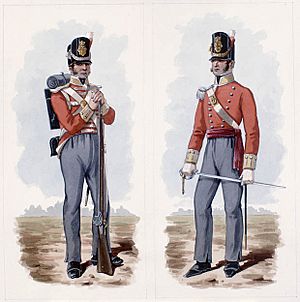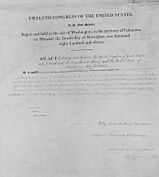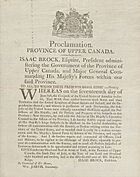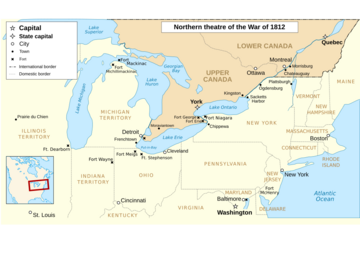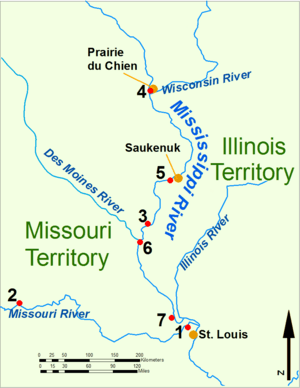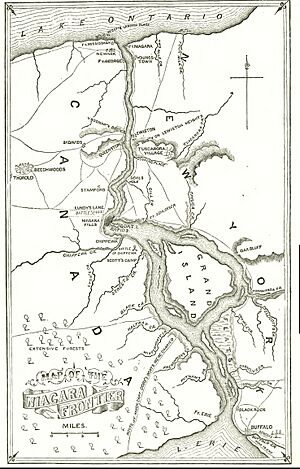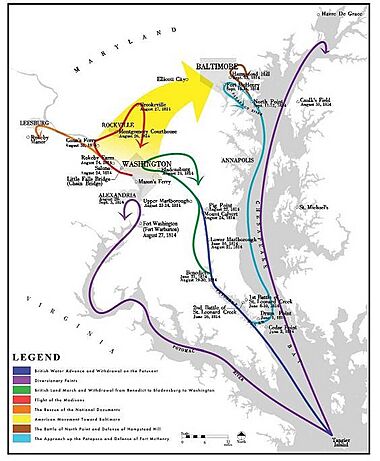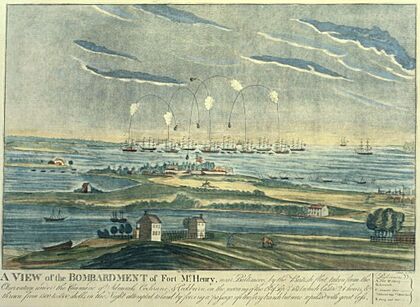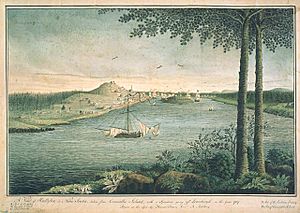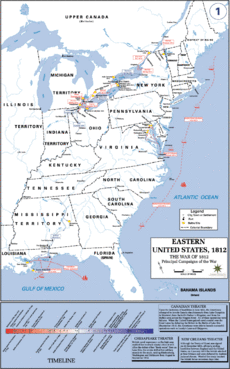War of 1812 facts for kids
Quick facts for kids War of 1812 |
|||||||||
|---|---|---|---|---|---|---|---|---|---|
| Part of the Sixty Years' War | |||||||||
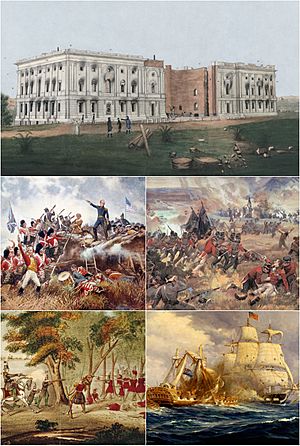 Clockwise from top:
|
|||||||||
|
|||||||||
| Belligerents | |||||||||
|
|||||||||
| Commanders and leaders | |||||||||
|
|
||||||||
| Strength | |||||||||
|
|||||||||
| Casualties and losses | |||||||||
|
|
||||||||
The War of 1812 was a conflict between the United States and its allies against the United Kingdom and its allies in North America. It started when the United States declared war on Britain on June 18, 1812. The war officially ended on February 17, 1815, after the Treaty of Ghent was agreed upon.
Tensions grew because of disagreements over land expansion in North America. Britain also supported Tecumseh's confederacy, a group of Indigenous peoples who resisted American settlement. Another major issue was the British navy stopping American ships and forcing American sailors into their service. This practice was called impressment.
During the war, the British navy created a strong blockade around American ports. This made it hard for the U.S. to trade. British and Canadian forces also stopped several American attempts to invade Upper Canada. In August 1814, British troops even captured and burned parts of Washington, D.C.. However, American forces won important battles at Baltimore and Plattsburgh. In the southern United States, American forces also defeated a group of Muscogee (Creek) warriors.
The Treaty of Ghent was signed in December 1814, bringing the fighting to an end. Before news of the treaty reached America, Andrew Jackson led American troops to a major victory against the British at the Battle of New Orleans in January 1815.
Contents
- Why the War Started
- Different Names for the War
- Who Fought in the War
- How the War Began
- Key Events of the War
- The Treaty of Ghent
- War's Impact and Costs
- What Happened After the War
- See also
Why the War Started
The War of 1812 began for several reasons. One major cause was the ongoing conflict between Britain and France in Europe. Britain tried to stop American trade with France. They also searched American ships and forced American sailors to join the British navy. This practice was called impressment. Many Americans saw this as an attack on their country's freedom.
Another reason was the desire for land in North America. American settlers wanted to expand westward. However, Indigenous tribes, like Tecumseh's confederacy, resisted this expansion. Britain supported these Indigenous groups, which angered the United States. Some Americans also hoped to gain control of Canada.
President James Madison and many members of Congress believed war was necessary. They wanted to protect American trade, stop impressment, and secure their borders. Not everyone agreed, though. Some political groups, like the Federalist Party, thought the war was a bad idea.
Different Names for the War
This war has been called by a few different names. In Britain, people sometimes called it "The American War of 1812." This helped them tell it apart from the bigger Napoleonic Wars happening in Europe.
In the United States, some people called it "Mr. Madison's War." This was because President James Madison declared war, and some political groups disagreed with him. Others called it the "Second War of American Independence." They felt it was another fight for America's freedom and independence from Britain.
Who Fought in the War
American Forces
The United States had a small but skilled navy. It included about 5,000 sailors and marines. Their biggest ships were frigates, which were fast and powerful. The American navy often used a strategy called "commerce raiding." This meant they tried to capture or sink British merchant ships.
The American army was larger in number at the start of the war. However, many soldiers were part of state militias. These militias were often not as well-trained or equipped as the regular army. Some American officers were very good leaders, but others were not. Over time, the army worked to improve its training and discipline.
British Forces
Britain's main focus was fighting Napoleon in Europe. So, they didn't send many soldiers to North America at first. The British army here had about 9,700 regular soldiers. These soldiers were very well-trained and experienced.
Canada also had its own local militias. These groups helped defend their homes against American attacks. The British navy was the strongest in the world. They had many ships, but most were busy fighting in Europe. In North America, they used ships on the Great Lakes to move supplies and support their army.
Indigenous Allies
Many Indigenous nations fought in the War of 1812. They were allies to either the British or the Americans, but they fought for their own reasons. They wanted to protect their lands and way of life.
Indigenous warriors, like those in Tecumseh's confederacy, were skilled in fighting in forests and using ambushes. They were very mobile and knew the land well. Their leaders made decisions based on what was best for their tribes. They used a mix of weapons, including muskets, bows, and tomahawks.
How the War Began
On June 1, 1812, President Madison sent a message to Congress. He listed the problems America had with Britain. After much discussion, Congress voted to declare war on June 18, 1812. This was the first time the United States officially declared war on another country.
Interestingly, Britain had actually decided to change some of its policies to avoid war. However, this news took too long to cross the Atlantic Ocean. By the time it reached America, the war had already started.
In Canada, British commander Isaac Brock quickly learned about the declaration of war. He warned citizens and soldiers to be ready. He also ordered the capture of Fort Mackinac, an important American fort for the fur trade. British forces, with help from Indigenous allies, successfully captured the fort.
Key Events of the War
Early Challenges
Neither side was fully ready for war. Britain was busy fighting Napoleon in Europe. Most of their army was far away. The British commander in Canada, George Prevost, focused on defending Lower Canada.
The United States was also unprepared. President Madison thought state militias could easily take Canada. However, the regular army was small, and many militia members were not well-trained. They often refused to fight outside their home states. The war was also unpopular in some parts of the U.S., especially New England.
Fighting in the West
Invasions of Canada in 1812
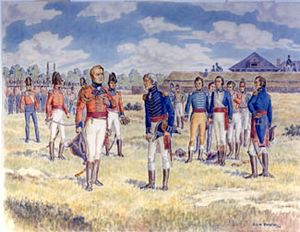
An American army led by General William Hull invaded Upper Canada in July 1812. Hull tried to get British subjects to surrender. However, his forces faced strong resistance and a lack of supplies.
Hull's army eventually retreated. British Major General Isaac Brock then attacked Detroit. Hull, fearing a larger British force and Indigenous allies, surrendered Detroit on August 16. Brock was a strong leader, but he was killed later that year at the Battle of Queenston Heights.
American Northwest in 1813
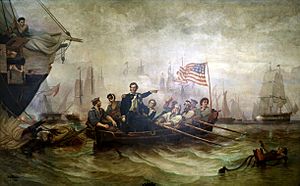
After losing Detroit, General William Henry Harrison took command of American forces. He aimed to retake the city. In January 1813, a part of his army was defeated at Frenchtown. Some American prisoners were killed after the battle, which became a rallying cry: "Remember the River Raisin!"
In May 1813, British forces and Tecumseh laid siege to Fort Meigs in Ohio, but the fort held. A major turning point came on September 10, 1813, at the Battle of Lake Erie. Captain Oliver Hazard Perry led the American navy to a decisive victory. This gave the U.S. control of the lake and forced the British to retreat from Detroit. Harrison then invaded Canada again, where Tecumseh was killed at the Battle of the Thames.
American West, 1813–1815
The Mississippi River valley was the western edge of the United States. American forts and trading posts were often attacked by British-allied Indigenous groups. In September 1813, Americans abandoned Fort Madison after attacks.
The American victory on Lake Erie cut off British supplies to Fort Mackinac. However, British forces, with Indigenous allies, recaptured a key trading post at Prairie du Chien. They also defeated American attempts to retake it. This meant the British and their allies controlled much of what is now Illinois and Wisconsin.
After the war, Britain returned Mackinac and other captured lands to the United States. However, fighting between Americans and some Indigenous tribes continued for several years.
Fighting in the American Northeast
Niagara Frontier in 1813
Control of the Great Lakes and the St. Lawrence River was very important. The Americans built a navy yard at Sackett's Harbor, New York, to build warships. In April 1813, American forces attacked York, Upper Canada, the capital of Upper Canada. They captured the town and burned some government buildings.
In May, Americans captured Fort George, Ontario. The British retreated, but then launched a surprise attack at the Battle of Stoney Creek in June, which was a British victory. Later, a smaller British force, warned by Laura Secord, forced an American force to surrender at the Battle of Beaver Dams.
In December 1813, American forces burned the village of Newark (now Niagara-on-the-Lake) before retreating. The British retaliated by capturing Fort Niagara and burning towns like Lewiston, New York and Buffalo.
St. Lawrence and Lower Canada in 1813
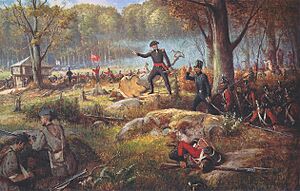
The British were vulnerable along the St. Lawrence River. In 1813, Americans tried to attack Montreal twice. General Wade Hampton I led one force, but was defeated at the Battle of the Chateauguay by a smaller force of Canadian and Mohawk soldiers.
Another American force, led by General James Wilkinson, sailed down the St. Lawrence. They were also defeated by British forces at Crysler's Farm. These defeats meant Montreal remained safe from American capture.
Niagara and Plattsburgh Campaigns in 1814
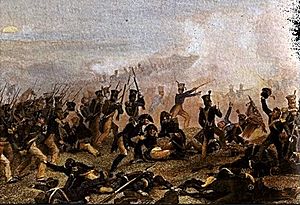
In 1814, the Americans invaded the Niagara frontier again. They captured Fort Erie and won a victory at the Battle of Chippawa. However, a very fierce and costly battle took place at Battle of Lundy's Lane in July. Both sides suffered heavy losses, and the battle was inconclusive.
After Napoleon's defeat in Europe, Britain sent 15,000 more troops to North America. General Prevost decided to invade New York State. He attacked Plattsburgh, but needed naval control of Lake Champlain. At the Battle of Plattsburgh on September 11, 1814, the American navy, led by Thomas Macdonough, won a decisive victory. This forced Prevost to retreat back to Canada.
Occupation of Maine
In July 1814, British forces captured Eastport, Maine without a fight. In September, British troops raided and looted towns in eastern Maine, including Hampden and Bangor. They occupied Castine and much of eastern Maine for the rest of the war. This territory was returned to the United States after the peace treaty.
Chesapeake Campaign
The Chesapeake Bay was an important target for the British. In 1813, British ships blockaded the bay and raided towns along the coast. The Americans built a special fleet of barges, called the Chesapeake Bay Flotilla, to defend the area.
Burning of Washington
In August 1814, a British force of 2,500 soldiers advanced up the Chesapeake Bay. They defeated American defenders at the Battle of Bladensburg. On August 24, British troops captured Washington, D.C.. They burned several public buildings, including the White House and the United States Capitol. American government officials fled to Virginia.
Siege of Fort McHenry
After burning Washington, the British moved to attack Baltimore. On September 12, 1814, British troops landed and marched towards the city. They fought American militia at the Battle of North Point, where the British commander, Major General Robert Ross, was killed.
The British navy also tried to attack Baltimore by water. They bombarded Fort McHenry, which guarded the harbor, for 25 hours. The American defenders held strong. Francis Scott Key, watching the battle, was inspired to write the poem that later became "The Star-Spangled Banner," America's national anthem. The British eventually gave up their attack on Baltimore.
Southern Fighting
Creek War
Before 1813, there was a conflict within the Muscogee (Creek) Nation. A group called the Red Sticks wanted to resist American expansion. They were allied with Tecumseh. In August 1813, the Red Sticks attacked Fort Mims, resulting in many deaths. This event rallied Americans to fight against the Red Sticks.
American forces, including militias from Tennessee and Georgia, and Indigenous allies like the Cherokee, fought against the Red Sticks. General Andrew Jackson led many of these forces. In March 1814, Jackson decisively defeated the Red Sticks at the Battle of Horseshoe Bend. This battle effectively ended the Creek War. After the war, the Creek Nation was forced to give up a large amount of their land to the United States.
Gulf of Mexico Coast
British forces, with Indigenous allies, tried to capture Fort Bowyer near Mobile in September 1814, but were repelled. In November, General Jackson's forces captured Pensacola, which was then Spanish territory.
In late 1814, the British launched a major attack on New Orleans. An expeditionary force of 8,000 British troops attacked Jackson's defenses on January 8, 1815. The Battle of New Orleans was a major American victory. The British suffered heavy losses, while American casualties were light. This battle made Andrew Jackson a national hero.
News of the peace treaty arrived shortly after the Battle of New Orleans. The British then abandoned their plans to capture Mobile and other areas along the Gulf Coast.
War at Sea
Britain's Royal Navy was the most powerful navy in the world. Most of its ships were busy fighting France. However, they still had many vessels in American waters. The United States Navy was much smaller.
The British strategy was to protect their own trade and blockade American ports. The American strategy was to use smaller, faster ships to attack British merchant vessels and engage British warships only when they had an advantage.
Ship Battles
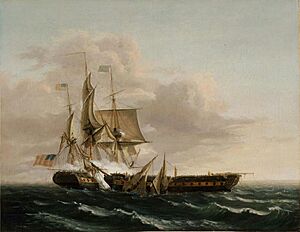
American frigates were often larger and more heavily armed than British frigates of the same class. This led to some famous single-ship victories for the U.S. Navy. For example, the USS Constitution defeated HMS Guerriere in August 1812. These victories boosted American morale.
However, the Royal Navy's large numbers meant they could eventually blockade most American warships in port. While American ships captured many British merchant vessels, the British navy captured even more American merchant ships.
Privateering
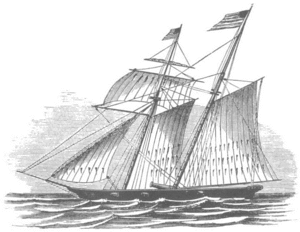
American privateers were privately owned ships given permission to attack enemy shipping. They were a big threat to British trade. American privateers captured many British merchant ships throughout the war.
The British also used privateers, especially from their colonies like Bermuda and Nova Scotia. These privateers were very effective at disrupting American coastal trade.
British Blockade
The British navy set up a blockade along the American coast. This made it very difficult for American ships to leave or enter ports. The blockade grew stronger as the war went on.
This blockade had a huge impact on the American economy. Exports and imports dropped sharply. It forced American merchants to use more expensive land routes for trade. The blockade also encouraged the growth of new factories in the United States, as British goods were harder to get.
Freedom for Enslaved People
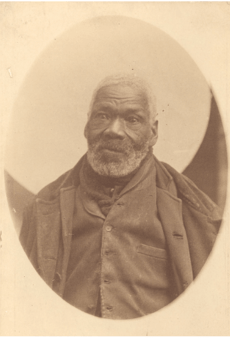
During the war, about 4,000 enslaved African Americans found freedom by escaping to British ships. The British government considered them free once they reached British lines.
Many of these freed people and their families were transported by the Royal Navy to places like Bermuda, Nova Scotia, and New Brunswick. Some younger men even joined a new British military unit called the Corps of Colonial Marines. These escaped slaves represented a significant step towards freedom for African Americans before the American Civil War. After the war, Britain paid the United States for the financial loss of these individuals.
The Treaty of Ghent
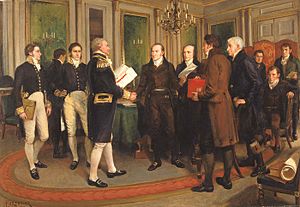
Peace talks began in Ghent, in present-day Belgium, in August 1814. Both sides wanted peace. The British had initially asked for a neutral zone for Indigenous peoples in the American Northwest. They also wanted naval control of the Great Lakes. The Americans, at one point, hoped to gain parts of Canada.
However, after the defeat of Napoleon in Europe, Britain's main focus shifted. The British Prime Minister, Lord Liverpool, decided to offer peace based on returning things to how they were before the war. This meant no land would change hands.
The Treaty of Ghent was signed on December 24, 1814. It called for all captured territory to be returned. The border between Canada and the United States would remain the same. The treaty was officially ratified and ended the war on February 17, 1815.
War's Impact and Costs
| Type of casualties | United States | United Kingdom and Canada |
Indigenous fighters |
|---|---|---|---|
| Killed in action and died of wounds | 2,260 | ~2,700 | ~1,500 |
| Died of disease or accident | ~13,000 | ~8,000 | ~8,500 |
| Wounded in action | 4,505 | ~3,500 | Unknown |
| Missing in action | 695 | ~1,000 | Unknown |
The war resulted in many casualties. The United States lost about 2,260 soldiers killed in action, with many more dying from disease. British and Canadian forces also suffered thousands of deaths. Many Indigenous warriors and civilians also lost their lives.
The war was expensive for both countries. It added a lot to their national debts. However, in the United States, the war also encouraged the growth of new factories and industries, as people had to make goods that were no longer imported.
What Happened After the War
Lasting Peace and Borders
The War of 1812 did not change the border between the United States and Canada. Neither side gained new territory. However, the relationship between the U.S. and Britain improved greatly. The issue of impressment became less important after the end of the Napoleonic Wars.
The Rush–Bagot Treaty in 1817 helped to remove military ships from the Great Lakes. This agreement set the stage for a peaceful border between the U.S. and Canada that still exists today.
Impact on Canada
After the war, leaders in Upper Canada became more wary of American influences. The war helped to bring together different groups in Canada, like French Canadians and British subjects. It played a role in forming a stronger Canadian identity. New forts and defenses were built to protect the colonies from future attacks.
Impact on Indigenous Nations
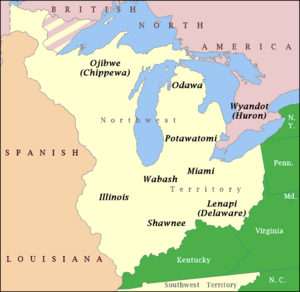
The Indigenous tribes who allied with the British lost their goal of creating a separate "Indian barrier state." The United States did not agree to this idea in the peace treaty.
Indigenous nations lost much of their land, especially in the Northwest Territory and the South. The American government built many new forts and encouraged American fur traders. This established strong U.S. control over these border regions.
Impact on the United States
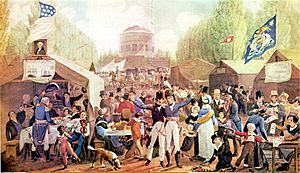
In the United States, the war created a strong sense of national pride and independence. Many Americans felt they had won their "second war of independence." The victory at New Orleans especially boosted national spirit.
The Federalist Party, which had opposed the war, lost much of its support and eventually disappeared. This led to a period known as the "Era of Good Feelings," with more national unity. The war also showed the need for a stronger navy, and the U.S. began building more warships. Several war heroes, like Andrew Jackson and William Henry Harrison, later became presidents.
The war also led to the United States gaining Florida from Spain in 1819. This happened because the war showed Spain that it could not easily control the territory.
See also
 In Spanish: Guerra anglo-estadounidense de 1812 para niños
In Spanish: Guerra anglo-estadounidense de 1812 para niños
 | Shirley Ann Jackson |
 | Garett Morgan |
 | J. Ernest Wilkins Jr. |
 | Elijah McCoy |


